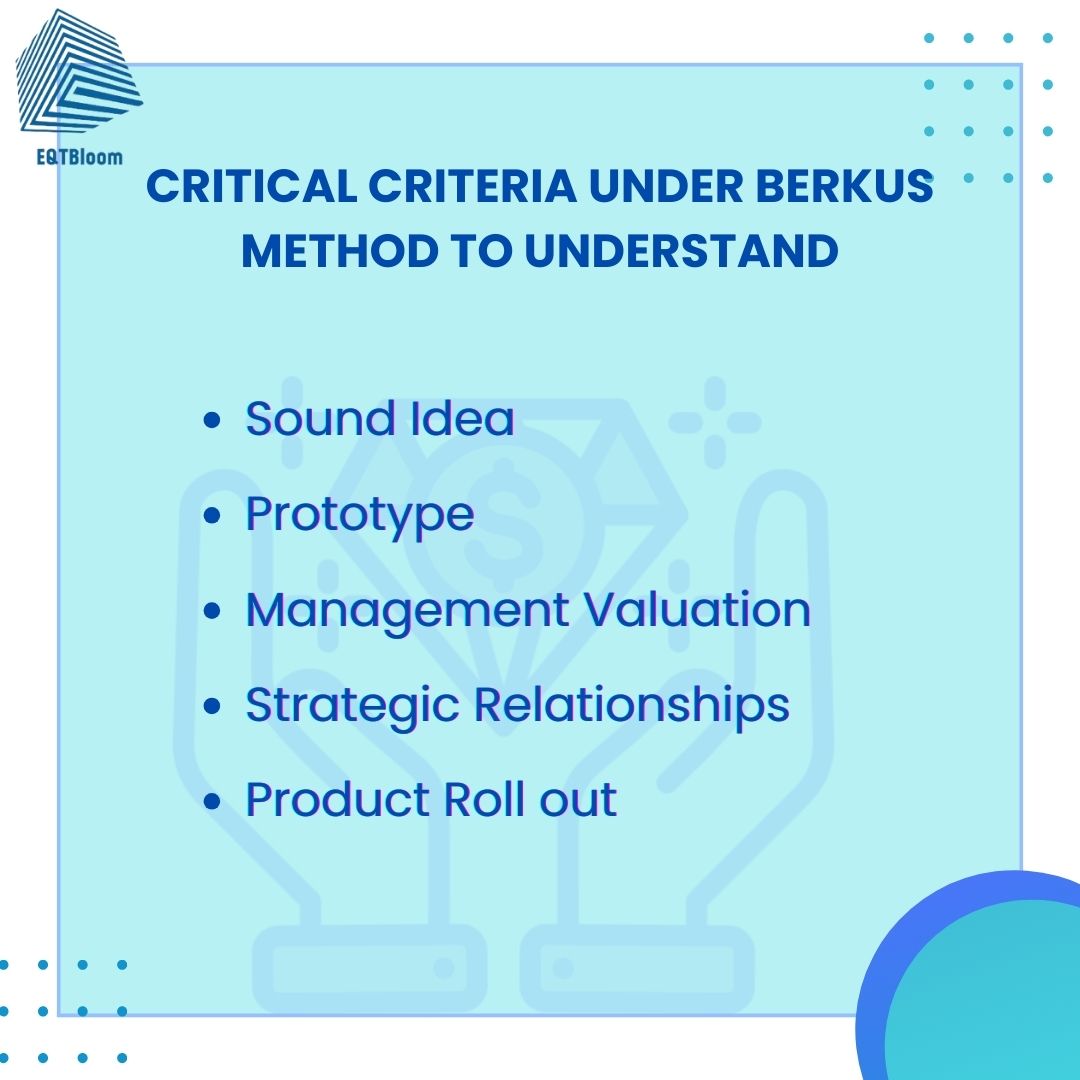A Guide to the Berkus Method for Startup Valuation
The Berkus Method of Valuation is an approach used for early-stage valuation purposes, specifically designed to establish a starting point without relying on the financial forecasts provided by the founder. This method evaluates five key areas of a startup and assigns a value within a range of zero to $500,000 for each area. These areas are as follows:
- Sound Idea: This pertains to the company having a promising and innovative business concept, valued between $0 and $500,000.
- Quality Management Team: This focuses on the company's ability to form a strong and capable management team, valued between $500,000 and $1,000,000.
- Prototype: This concerns the presence of a well-developed product or prototype that is attractive to customers, valued between $1,000,000 and $1,500,000.
- Strategic Relationships: This evaluates the company's establishment of valuable strategic partnerships, alliances, or a growing customer base, valued between $1,500,000 and $2,000,000.
- Product Rollout or Sales: This looks at the company's revenue growth and the potential for profitability, valued between $2,000,000 and $2,500,000.
Combining the values assigned to each of these areas produces the pre-money valuation for the startup. The original Berkus method included five areas with a maximum value of $500k each, resulting in a theoretical maximum pre-money valuation of $2.5 million.
Quantitative and Qualitative Factors in Company Valuation
In the evaluation of early-stage companies, a significant challenge arises from the limited availability of revenue data. Many startups are at the minimum viable product (MVP) stage, making revenue and profit projections unreliable. Traditional valuation methods heavily rely on financial projections, yet few early-stage startups meet or surpass these initial forecasts. This often results in inaccuracies in quantitative valuation models.
The Berkus Method offers a solution by incorporating both qualitative and quantitative factors in the valuation process. By considering five key elements, this approach aims to provide a more comprehensive and nuanced assessment of a company's worth.
- Established business model with a solid foundation
- Functional prototype to mitigate technological risks
- Capabilities of the founding or management team to minimize implementation risks
- Strategic partnerships to reduce market risks
- Existing customers or initial sales to decrease production risks.
In the given example, our startup holds a total startup pre-money valuation of EUR 1.35m. The team behind this fictitious startup is highly promising, consisting of serial entrepreneurs, thus receiving the highest value (EUR 390k) in this category. As emphasized by Bill Payne, the creator of the Scorecard Method, success in building a business largely depends on the quality of the team. A strong team can address early product flaws effectively, highlighting its significance.
The prototype available for our example startup is robust, developed based on Minimum Viable Product (MVP) findings, thereby diminishing technological risk for potential investors and earning a value of EUR 290k. The business model, quality, and potential of the idea itself are deemed average (EUR 250k). Furthermore, interest from prominent corporates in collaborating with the startup led to an allocation of EUR 245k to the Strategic Relationship value driver. While the product's intellectual property (IP) is still pending, it holds a value of EUR 180k.
In the event of a successful partnership between the startup and an investor, sustainable sales are anticipated. Subsequently, the Berkus Method will be replaced by more quantitative valuation procedures in subsequent fundraising rounds.
Why do early-stage startups opt for the Berkus Method as their preferred valuation approach?
Many organizations struggle to meet their financial projections and take steps to address their poor track record in meeting financial targets. It is important to note that economic predictions should not be based solely on startup valuations. Management should be cautious of aggressive revenue growth projections that may include unrealistic profit margins. To mitigate risks, banks often conduct sensitivity analysis to assess a company's repayment capacity, and the Berkus method approaches startup valuation from a risk perspective.
The Berkus valuation method assigns a value to the business idea and the four key success factors of the company, with each category having a maximum value of $500,000. Identifying critical value drivers helps to pinpoint risk areas that could impact the company's success. Proper management of these key risks is crucial for the company's success. As a company reduces its key risks, its overall value increases. Therefore, risk reduction and company valuation are strongly linked. The Berkus method is best suited for very young, pre-revenue startups and may not be appropriate for valuing companies with established recurring revenue streams.
Advantages of Berkus Valuation method
The Berkus valuation method offers several key benefits:
- Simplicity: The Berkus Method provides a straightforward approach based on qualitative factors, making it a traditional and effective way to estimate the value of pre-revenue startups.
- Flexibility: Users can easily customize the model to fit their specific circumstances.
- Focus on Governance and Risk Management: This method prompts users to consider important factors such as corporate governance, risk management, and the skills of the management team. It encourages a deeper analysis of the startup's strengths, weaknesses, and conflict resolution strategies.
- Quick and Efficient: Founders and early-stage investors, including business angels, venture capital funds, and crowd funding backers, can benefit from a rapid and user-friendly valuation process.
Limitations of the Berkus Valuation method
This method's simplicity is both a strength and weakness. Founders and investors must recognize the limitations of startup valuation. Founders aim for high valuations for profit, while investors prefer low valuations. Completing a Berkus valuation exercise can be done quickly, but understanding the business risk profile and financial risks is crucial. A complete financial plan is necessary for assessing capital requirements and understanding business dynamics. The method may overlook important pitfalls for startups, such as financial risk.
Conclusion
Overall, the Berkus valuation method is a simple, adaptable, and user-friendly approach to valuing pre-revenue startups. It provides a valuable framework for angel investors and startup entrepreneurs to assess startups in the early stages of development.






